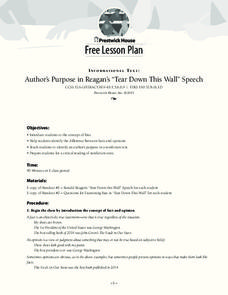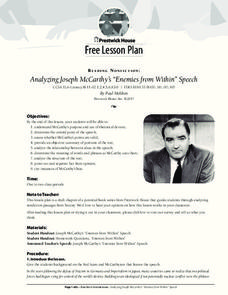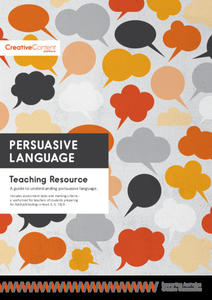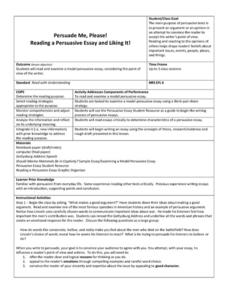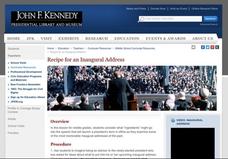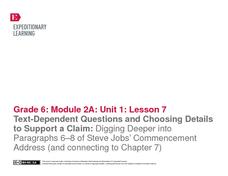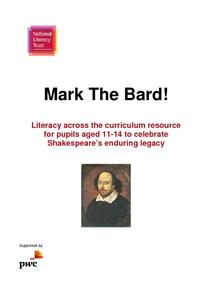EngageNY
Analyzing Language in a Speech: The Montgomery Bus Boycott Speech
Scholars analyze the use of active and passive voice in The Montgomery Bus Boycott speech and refer to an Active and Passive Sentences handout while viewing the text. Pairs of learners then work together to identify passive and active...
Prestwick House
Author’s Purpose in Reagan’s “Tear Down This Wall” Speech
President Ronald Reagan's "Tear Down This Wall" speech, delivered on June 12, 1987 before the Berlin Wall, provides class members with an opportunity to examine three key aspects of informational text: author bias, the use of facts and...
University of North Carolina
Speeches
A handout on speeches, part of a series on specific writing assignments, helps individuals develop their speech-writing skills. The resource starts with a discussion on audience and purpose and ends with tips to engage the audience.
Prestwick House
Reading Nonfiction: Analyzing Joseph McCarthy's "Enemies from Within" Speech
Looking for a lesson that teaches class members how to analyze nonfiction? Use Joseph McCarthy's famous "Enemies from Within" speech as a instructional text. Worksheet questions direct readers' attention to the many historical references...
Creative Content Australia
Persuasive Language
Language has power. Use the materials in a language arts teaching guide to equip learners with the knowledge of the persuasive techniques, both verbal and visual, that can be used to influence thinking.
EngageNY
Speech Structure: Unions as Agents of Change— Part 2
Scholars continue reading César Chávez's 1984 speech, "Address to the Commonwealth Club of California." Working with partners, they complete graphic organizers to determine a claim that Chávez makes about the UFW.
EngageNY
Speech Structure: Part 2 of the Commonwealth Club Address
Scholars continue reading and analyzing César Chávez's 1984 speech, "Address to the Commonwealth Club of California." Working with partners, they answer text-dependent questions about how governments and consumers affect working...
Fluence Learning
Writing an Argument: Free Speech
How do you assess whether pupils have mastered certain concepts and skills? Designing a performance task that asks learners to demonstrate their skills and providing writers with a rubric that identifies these skills and provides...
EngageNY
Reading Closely: Introducing Chávez’s Commonwealth Club Address and Considering the Plight of the Farmworker
How can a persuasive speech help inspire social change? Scholars read along as they listen to the first half of César Chávez's 1984 speech, "Commonwealth Club Address." Next, pupils use graphic organizers to analyze one of Chávez's...
K20 LEARN
The War of the Words: Grammar and Parts of Speech
Here's a lesson that adds some zip to a study of parts of speech. Class members read two versions of the same article, one loaded with evocative nouns, verbs, adjectives, and adverbs, while the other is missing this sensory language....
Bermingham City Schools
Opinion Writing
It's no secret that children can be very opinionated, but rather than fight against this natural tendency, embrace it with this primary grade writing project. After a shared reading of a children's book about persuasion, young learners...
Curated OER
Teaching Debate to ESL Students
Language learners use the debate format to practice formulating, expressing, and defending their ideas. Working in teams, class members develop resolutions, use opinion indicators to express their opinions and reasons, and prepare...
Saskatchewan Elocution and Debate Association
Grab ‘N Go Debate
Here's a resource that provides debaters with the background information and worksheets they will need when planning a policy debate. Templates and sentence frames, as well as a rationale for using debates in the classroom, are included...
EngageNY
Reading Closely and Introducing Rhetoric Toolbox: Unions as Agents of Change—Part 1
Scholars explore the question of whether labor unions are the agents of change as they continue reading César Chávez's 1984 speech, "Address to the Commonwealth Club of California." They discuss rhetoric in Chávez's speech and discover...
EngageNY
Mid-Unit Assessment: How Chávez Develops His Claims in the Commonwealth Club Address
Scholars complete a mid-unit 2 assessment, analyzing how César Chávez supports his claims in his 1984 speech, "Address to the Commonwealth Club of California." Learners focus on paragraphs 18 and 19 of the speech, answering text-based...
K20 LEARN
#Summarize: Summarizing
What are the effects of one's life experiences? Class members view a slam poetry reading, a speech by President Obama, and read a short story by John Steinbeck about responding to tragedies. They summarize these events and then craft a...
Ohio Literacy Resource Center
Arguing with Aristotle Ethos, Pathos, Logos
Introduce your classes to the Art of Rhetoric with a lesson that focuses on Aristotle's persuasive appeals and how they have been used, both ethically and unethically, to influence opinion.
Curated OER
Persuade Me, Please! Reading a Persuasive Essay and Liking It!
Persuade your writers that crafting arguments is not that difficult. They only need to follow the steps outlined in this resource.
Literacy Design Collaborative
The Art of Persuasion: How Rhetorical Devices Influence Audiences
Scholars analyze a variety of text to identify the development of claims and persuasive techniques writers use. In each text, pupils determine the argument and the persuasive techniques and complete a task introduction worksheet. The...
John F. Kennedy Presidential Library & Museum
Recipe for an Inaugural Address
An inaugural address represents the first moments of a new beginning. Using John F. Kennedy's speech as a model for guided practice, groups examine the ingredients of an inaugural address. Individuals then repeat the analysis process...
Speech and Debate Union
Introducing Debate in the Classroom
Considering organizing a speech and debate club? check out this packet that contains all the information you need to get started.
EngageNY
Text-Dependent Questions and Choosing Details to Support a Claim: Digging Deeper into Paragraphs 6–8 of Steve Jobs’ Commencement Address (and connecting to Chapter 7)
Readers learn how to choose specific details drawn from a primary source (Steve Jobs' 2005 Stanford University commencement address) to support an analysis of informative text.
National Literacy Trust
Mark The Bard!
Commemorate the 400th anniversary of Shakespeare's death with a packet of cross-curricular literacy lessons and activities centered around two of the Bard's most popular plays, Macbeth and The Tempest. Class members look for evidence of...
K20 LEARN
Friends, Romans, Countrymen, Lend Me Your Emotions: Julius Caesar
Scholars, high schoolers, class members! With the help of this lesson, you too can identify the three persuasive appeals (ethos, pathos, and logos) the characters in William Shakespeare's tragedy Julius Caesar used to convince their...



